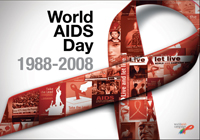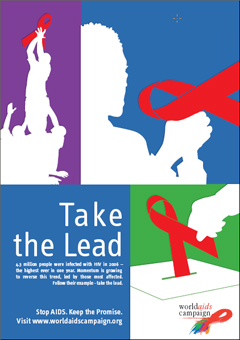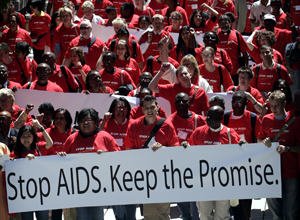
Young leaders have innovative ideas about how to reach their peers.
Following UNAIDS calls for putting young people’s leadership at the centre of national HIV responses, a new small grants programme for youth-led organizations and projects, the HIV Young Leaders Fund, announced their request for proposals. The mission of the Fund is to enable new leadership in the AIDS response among young people who are most-at-risk and vulnerable to HIV and young people living with HIV.
“Peer-based programming is highly effective yet chronically underfunded and youth-led programs often lack support for core resources,” said Liping Mian, World AIDS Campaign Youth Campaign Coordinator and HIV Young Leaders Fund Interim Steering Committee member.
Globally, young people aged 15-24 account for 40% of all new infections and in 2008; at least 2 out of every 5 people newly infected with HIV were 15-24 years old.
As noted in its Outcome Framework: Joint Action for Results (2009-2011), UNAIDS has made empowering young people one of its priority areas. The goal in this priority area is to reduce the number of new HIV infections among young people (aged 10 to 24 years) by providing comprehensive sexual and reproductive knowledge, skills, services and commodities in a safe and enabling environment, tailored to the specific country and epidemic context.
Peer-based programming is highly effective yet chronically underfunded and youth-led programmes often lack support for core resources.
Liping Mian, World AIDS Campaign Youth Campaign Coordinator and HIV Young Leaders Fund Interim Steering Committee member
Depending on the context, most-at-risk and vulnerable young people include young men who have sex with men, young transgenders, young sex workers, young injecting drug users, young women and young people living with HIV.
The Fund, administered by the Tides Foundation, will support youth led organizations and youth-led projects working on peer-based services, community mobilization, and advocacy. Organizations from all countries can apply for grants whose amount range goes from $1,000 to $30,000. The deadline for grant applications is May 1, 2010. Grant-making decisions will be made by regional community review panels composed of young leaders.
The new small grants programme is one of the recommendations from the 2009 aids2031 Young Leaders Summit that took place in Oslo in June 23 – 25. During the three day Summit, more than 30 young leaders from around the world worked together to identify pressing stigma and discrimination issues for young people and identify ways to leverage current strategies and collaborations.
To request grant materials in Arabic, English, French, Russian or Spanish, please e-mail HIVYoungLeadersFund@gmail.com
An Interim Steering Committee serves as the governing body for the HIV Young Leaders Fund in 2010. The following organizations are on this governing body: Global Network of Sex Work Projects, Global Youth Coalition on HIV/AIDS, GNP+’s Interim Reference Group on Young People Living with HIV, International Treatment Preparedness Coalition, Jamaica Youth Advocacy Network, World AIDS Campaign, Youth Coalition for Sexual and Reproductive Rights, Y-PEER, Young Positives, and Youth R.I.S.E.











